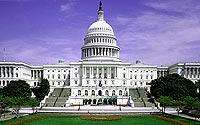Anti-Piracy Bill Stalls In House
- by Wendy Davis @wendyndavis, January 16, 2012

Faced with intense opposition by Web companies, Internet engineers and digital rights advocates, lawmakers in the House appear to be putting the brakes on a controversial anti-piracy measure.
Rep. Lamar Smith (R-Texas), who sponsored the House bill, said late last week that he would drop one of the most contentious portions of the bill -- a provision for orders directing Internet service providers to block access to certain domains.
On Saturday, Rep. Darrell Issa (R-Calif.), who opposes the Stop Online Piracy Act, said he received assurances that Congress won't vote on the measure until a consensus is reached.
The Stop Online Piracy Act, like the Protect-IP Act in the Senate, is aimed at “rogue” piracy sites -- or sites dedicated to infringement. In addition to divisive domain-filtering provisions, the legislation provides for court orders banning credit card companies and ad networks from doing business with sites deemed rogue. The bills would enable courts to order search engines from returning links to such sites.
Movie studios and some other content owners say that the law will help stem infringement, particularly by companies that operate abroad and can't be hauled into courts in the U.S.
On the other hand, Web companies, including Google and Facebook, Internet engineers, law professors and digital rights advocates, say the legislation won't curb piracy and poses significant threats to free speech, as well as Internet security. Opponents see a risk that courts could order ISPs to block access to sites with legitimate content.
Critics also say that court-ordered domain filtering will be ineffective, given that users could still reach sites by typing in numerical address, or accessing the sites through foreign servers.
Several Web companies -- including social news site Reddit and online encyclopedia Wikipedia -- said recently that they intend to go dark in Jan. 18 to protest the legislation.
On Friday, the White House waded into the debate, issuing a statement disavowing support for any bill “that reduces freedom of expression, increases cybersecurity risk, or undermines the dynamic, innovative global Internet.”
Provisions of the bills requiring domain filtering appeared particularly problematic to the officials who authored the statement -- Victoria Espinel (intellectual property enforcement coordinator at Office of Management and Budget), Aneesh Chopra (chief technology officer at the Office of Science and Technology Policy) and Howard Schmidt (cybersecurity coordinator for National Security staff).
“Our analysis of the DNS filtering provisions in some proposed legislation suggests that they pose a real risk to cybersecurity and yet leave contraband goods and services accessible online,” the officials said. “We must avoid legislation that drives users to dangerous, unreliable DNS servers.”
At the same time, the officials said there was a need for tougher laws. “Existing tools are not strong enough to root out the worst online pirates beyond our borders,” they added. “That is why the Administration calls on all sides to work together to pass sound legislation this year that provides prosecutors and rights holders new legal tools to combat online piracy originating beyond U.S. borders.”
Digital rights advocates cheered news of the recent developments. Advocacy group Public Knowledge said that the White House's statement, combined with news that the House vote will be delayed “shows that the messages being sent by the public in opposition to this bill are finally getting through to Washington.”
Despite news of the delay in the House, the Senate is still expected to vote on Protect-IP on Jan. 24 -- although it's possible that the bill will be revised before that date. Senate Judiciary Committee leader Patrick Leahy (D-Vt.) said last week that he would consider changing the Protect-IP Act's blocking provisions. Six senators on the Judiciary Committee said more time is needed to study the bill and urged Majority Leader Harry Reid (D-Nev.) to delay a vote on the measure.


